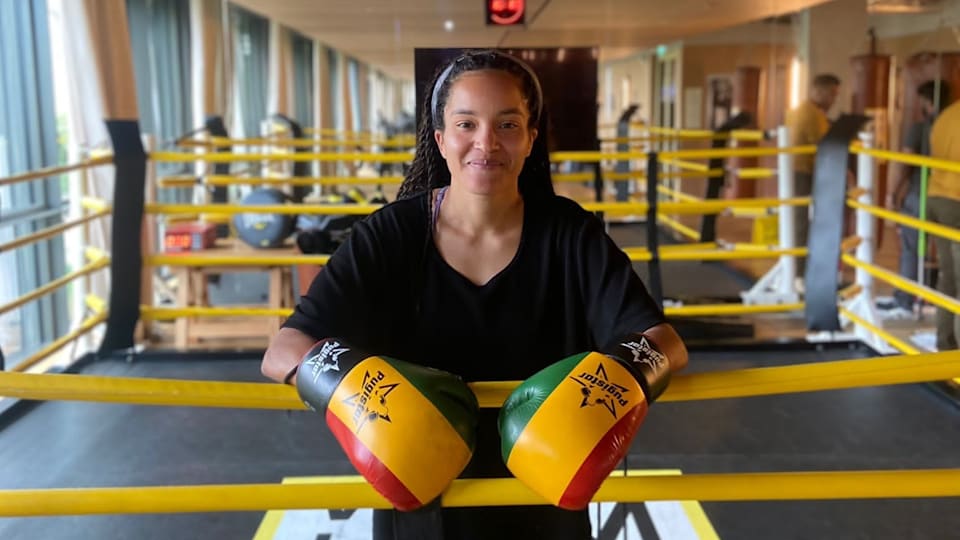African Games silver medallist Marine Fatoumata Camara: "Boxing is empowerment for women"
In an exclusive interview with Olympics.com, Camara - currently Mali's only female boxer - reveals how the sport allowed her to express herself, the stereotypes she had to overcome, and how boxing can help young people in society.

Marine Fatoumata Camara is a trailblazer in the world of boxing, standing as Mali’s sole female competitor on the international stage.
She made headlines at home after winning 57 kg silver at the 2019 African Games, and hopes to qualify for the Olympic Games Paris 2024 at the Boxing Africa qualifier in Dakar, Senegal, 9-15 September.
It may come as a surprise, therefore, that the talented pugilist only began participating in the sport ‘by mistake’.
“When I was young, I was a big WWE wrestling fan. I wanted to be a wrestler because I was inspired by the entertainment,” Camara told Olympics.com.
“One day I was walking down the street and there was a sports forum and that's where I met a boxer. And I asked him, ‘Do you know if there's a wrestling gym here?’ He said, ‘No, but there is a boxing gym, so maybe you can try’. I got started and then I never left because I truly fell in love with the sport.”
Marine Fatoumata Camara: “When I want something, I have to get it”
As the only female initially in the boxing gym, Camara had some stereotypical attitudes to overcome.
But she was determined to succeed and was aided by her mental fortitude.
“I think it's my mindset, like I'm a very, very quiet person, but I have a lot of stubbornness in me and I’m a big dreamer," she said. "When I want something, I have to get it and I had a lot of things to express. When I started boxing, it felt like the solution to all my problems.
“And when I talked about this to my parents, they said, 'No, there is no way you're going to do this!' But because I'm stubborn, I said, 'I don't care, I will do it’, and they had to follow. My father quickly got into it and became a big supporter of mine."
Camara’s coach quickly recognised her potential and convinced her to start competing in matches.
The featherweight was successful and a new dream began: becoming a world champion.
However, the star student ultimately regarded the sport as supplementary to her studies, and almost quit competing to focus on her academic pursuits.
“I wanted to focus on school because I was a good student and I have a lot of degrees,” she continued. “My parents were like, ‘You don't win money in boxing’, so I decided to change.”
Marine Fatoumata Camara's accepted an invitation to represent Mali at the 2019 African Games after almost quitting boxing.
But fate had other plans for Camara, and just before she gave up on boxing she was asked to represent Mali internationally at the 2019 African Games in Rabat, Morocco.
She accepted the invitation and returned the faith put in her by winning the 57kg silver medal. It was a moment that changed the trajectory of her life.
“After that, people started talking about competing at the Olympics and many other things and I thought that maybe my dream would come true. When the opportunity finally came, I took it.”
Creating more female role models in Africa
Since winning that medal, Camara’s purpose has changed: to become an Olympian.
“I think about this every day. And it's been like this for maybe three, three years now," she said. “That's why I wake up and I go to bed. I've got a lot of people that believe in me and it's my pleasure to bear this responsibility.
“I want to live that feeling (of winning a medal) again. When I was young, I was a fan of the Olympics, watching Michael Phelps, Usain Bolt, all these men. I wanted to be like them and to inspire everybody. Maybe now I can.”
In a world dominated by men playing sport in Mali, it’s perhaps unsurprising that Camara’s role models were all male.
It’s a point not lost on the boxer, who wants to inspire women to follow in her footsteps.
"In Mali it's a very patriarchal society. When I started boxing, there were only men in my gym. But after I started to perform internationally, in my gym we have seen a change from 100% men to a 50/50 split. In fact, in my gym there are more women competing than men now.
“I eventually got the opportunity to be involved as a coach for the kids. Once again, there were only boys in the beginning, but then parents started to see me and they started to say, 'Oh, maybe I can take my girls, too.' And so I started to have a lot of girls too on mixed teams.
“My hope is to have one female Olympic champion from Mali because if you have one champion, then girls say, 'I want to be that champion like Naomi Osaka in America.’ Having a Black woman being a champion, you say, 'Okay, me too. I can be a champion’.
"This summer, I went to Mali for the first time in a long time, and I met people in the streets calling my name. I even met people that built a gym with my name, and I receive messages every day like, 'When are you coming? We follow you.' When I made the performance at the World Championship, I received maybe 200 messages in one day. That’s when I realised that by being myself I could inspire so many people.”
Mali's Marine Fatoumata Camara en route to boxing silver at the 2019 African Games in Rabat, Morocco. She reveals exclusively to Olympics.com how boxing empowered her, and how she is using it to empower others in Mali and Africa.
Helping Mali's youth and finding inner peace
While becoming a world champion is Camara’s dream, it’s clear that serving her community and improving the lives of others is her key motivation in life.
To help combat this social inequality, the economics and finance student has set up a business school which helps the youth in Mali find employment through boxing, alongside running womens, kids, and migrants training programmes.
“A big problem with Mali is unemployment and we have talented young people," she said. “I want to use boxing to show recruiters the potential in youth that have no skills but that are willing to learn and to help them find their job.”
While many are driven by medals, money and fame in the professional ranks, the featherweight’s desires are somewhat more intrinsic.
“What I want to achieve is inner peace. Most of the boxers that I've met have their own stories, whether it's maybe violence at home or difficulties growing up or whatever,” she said.
“But what I want to achieve is inner peace, because when you are at peace with yourself, you can also be at peace with others.”

